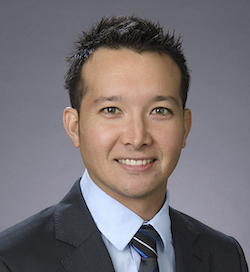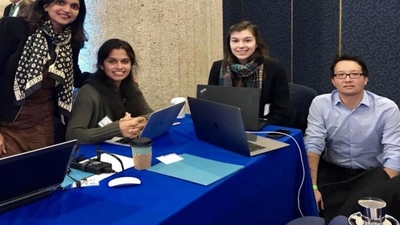
Past Challenge Winner Q&A: Tim Mackey of S-3 Research
Challenge.gov Catches Up with a 2017 SUD Startup Challenge Winner
Recently, the National Institute on Drug Abuse (NIDA), one of the components of the National Institutes of Health (NIH), announced the winners of its fifth “$100,000 for Start a SUD Startup” Challenge, which was hosted on GSA’s Challenge.gov platform. The SUD Startup Challenge goal is to support research ideas that would further an understanding of substance use disorders (SUD) and that are intended to lay the foundation for the development of successful new startups.
In anticipation of the announcement, Challenge.gov recently caught up with a past winner to learn more about their motivation to participate in NIDA’s annual competition, what they learned from the experience, what impact their prize-winning solution is making today, and what advice they have for the latest crop of winners.
*NOTE: The General Services Administration (GSA) is not affiliated in any way with this particular competition nor is this profile intended to be an endorsement of the winning company. References to any specific commercial products, process, service, manufacturer, company, or trademark does not constitute its endorsement or recommendation by the U.S. Government or GSA. As an agency of the U.S. Government, GSA cannot endorse or appear to endorse any specific commercial products or services.
INTRODUCTION

Who are you?
My name is Tim K. Mackey, and I am the co-founder and CEO of S-3 Research LLC. I’m essentially a researcher-turned-entrepreneur with the help of the U.S. government through the SUD Startup Challenge award and the Small Business Innovation Research (SBIR) program. I am also a current associate professor at UC San Diego where I teach and research on global health, health technology, and public policy.
What is the name of your company, where is it located, and what does it “do”?
S-3 Research is located in San Diego as all our employees are either current or past students and faculty from UC San Diego. It stands for “Social, Surveillance, Security,” encompassing our primary technology that uses machine learning to detect illegal sales of opioids and other drugs online.
What year did you win the SUD Startup competition?
We were winners of the challenge in 2017.
In layman’s terms, what was your winning entry?
At the time, we were proposing to take our early academic research using social media surveillance and unsupervised machine learning to develop a more comprehensive surveillance system that could scan multiple social media platforms. Critical to this objective was the early development of a stable data collection and analysis process that could eventually be used as an illicit online opioid diversion surveillance solution.
BACKGROUND
What is your background?
My background is primarily academic, though I also worked over a decade in the private sector in the medical device field before completing my Ph.D. in global health in 2013. After graduating, I went on to a faculty appointment at UCSD and have been a professor ever since. One of my primary areas of research is studying the illegal sales of drugs online and also the global challenge of falsified and substandard medicines. Through the challenge award, we have been able to take this research and translate it so that it can have a real-world impact.
What inspired you to focus on Substance Use Disorders?
The scourge of the opioid epidemic and its toll on society is real and acute. I’ve been studying illegal sales of drugs online my whole career, and when the opioid epidemic hit, we saw a flood of diversion go online. I was inspired first as a Master’s student at UC San Diego when I went to a graduate seminar where a woman named Francis Haight talked about the tragedy of losing her teenage son, Ryan Haight, when he purchased Vicodin online and overdosed. Subsequently, Federal legislation “Ryan Haight Online Pharmacy Consumer Protection Act of 2008” was passed to make it illegal to sell controlled substances online. From that point on, I decided that fighting illegal online sales of drugs would be one of my core goals as a researcher.
How did you hear about NIDA’s SUD Startup Challenge and why did you decide to apply?
We heard about the challenge after participating in the HHS 2017 Opioid Code-a-Thon after being invited to form a team by a colleague formally at the U.S. Centers for Disease Control and Prevention. We were chosen as a finalist but didn’t win one of the three prizes, however, this gave us the opportunity to learn about the Challenge award and we applied.

Was there anything about the application process that you’d change?
No, it was pretty abbreviated and even the video helped us focus our value proposition.
WINNER
What did you do with the prize money?
The prize money was the basis for forming S-3 and a subsequent SBIR fast track contract submission. If we hadn’t gotten the prize money, S-3 likely would have never been formed, and we would have stayed as academic researchers.
What was one piece of advice you learned during the process that has made a major impact on the evolution of your business?
Dr. Koustova really encouraged us to put in the hard work of following a format for writing our SBIR and not taking any short cuts. It required a shift in the way we thought about grants from only a science perspective to a business and commercial development perspective as well. There isn’t one piece of advice I can point to but she made sure to let us know how important our innovation was, how it could make a tangible impact, and why we needed to pursue it outside of academia.
Can you share any stories of how your winning solution has affected someone’s life for the better?
Our solution protects consumers, but we rarely get to see the fruits of our labor as we pass on our surveillance results to law enforcement and regulators to take action. That said, we are doing quite a bit of work now on fake and counterfeit COVID-19 products being sold online, (“COVID-19 scam reports, by the numbers”). We know that our efforts will help address one part of this pandemic, and we hope our solution ensures that the public is not harmed or scammed at this critical time for all of us.
FUTURE
What has transpired for you and your company since winning the competition?
We’ve gone on an exciting journey from winning the Challenge, starting up our company, submitting our fast track SBIR Phase I & II proposal, getting it awarded, finishing up our Phase I and the NIH I-Corps program, and now going through the transition to a possible Phase II. It has been a wild ride, including several published papers, visits to key stakeholders (including staffers on the Hill and the White House Drug Czar), some great media coverage, and lots of pitch sessions. Through it all, our interdisciplinary team of public health professionals, computer scientists, policy wonks, and researchers have explored many other issues involving illicit trade on the Internet (including wildlife trafficking, other fake goods, and as mentioned, fake COVID-19 treatments). The HHS Code-a-thon and competition was just the start, and we are certain the journey will continue to be both challenging and exciting.
Have you successfully competed for NIDA Small Business Innovation Research (SBIR) and Small Business Technology Transfer (STTR) Funding? Or any other federal funding?
Yes, as stated above, we competed and were awarded a phase I SBIR contract and are now in the process of transitioning to a phase II.
What impact has your winning idea had on furthering a better understanding of Substance Use Disorders?
Even though I’ve been doing research in this area for over a decade, I’ve learned so much through translating this winning idea into an early-stage commercial project. The fact is that online sales of opioids and other illicit drugs are everywhere, and those suffering from substance use disorders are the real victims as this content that feeds their addiction is pervasive throughout the Internet. We’ve seen different strategies from illegal drug sellers, including targeting online users when they are going through difficult transitions of use or episodes of vulnerability. The challenge is that if we address opioid diversion by shutting down “doctor shopping” and street buys, if it is still available on the Internet and social media, then this tragedy of addiction will just continue to perpetuate. Our solution provides critical public health intelligence on the manner in which opioid drug diversion is increasingly occurring on multiple parts of the Internet. Specifically, as state and federal governments enact policies to limit substance abuse behavior (such as restricting prescribing of opioids, enforcement against pill mills, etc), the manner in which users are exposed to and access opioids is moving towards online platforms that market directly to the consumer and evade traditional enforcement measures. Our commercial product provides intelligence by detecting these illegal online drug dealers in the digital marketplaces they now reside, including social media platforms, the dark web, illegal online pharmacies, e-commerce sites, and online group pages. We also have the ability to detect patterns of drug diversion from the perspective of import and export of products from other countries via online communications and vendors in multiple languages. This intelligence will enable regulators, law enforcement, and industry to identify priority targets for interdiction, report violating accounts to technology platforms, and effectuate better prosecution of cybercrime investigations.
ADVICE
What advice do you have for the latest class of SUD Startup Challenge winners?
Please, please, please take advantage of your mentors who can help you through the entrepreneurship and SBIR process. I’ve been a researcher for forever, and no one taught me how to write grants so precisely or coached me through how to champion my own ideas and innovation. The opportunity for this mentorship is priceless and will set you up for immediate and long-term success.
What advice do you have for the larger solver community?
Keep going with your ideas and innovation. Though we’ve had success with the challenge and our SBIR, that’s only come after numerous papers getting rejected, grants going unfunded, and investors saying that the problem we are addressing is not important or can’t make money. If you believe in what you are doing, you really have no choice but to follow it. However, belief is never enough, it’s the hard work, late nights, and dedication of your team, and of course a bit of luck and circumstance created by that hard work that will get you closer to where you are trying to go. And when you get there, you just have to keep pushing.
CLOSING
Is there anything else that you’d like to share that we haven’t asked you?
I just want to express my thanks to all the people at the NIH and specifically the NIDA SBIR program. They are the reason why our innovation is being translated into something that will directly impact people’s lives, and hopefully, help bring an end to this terrible opioid epidemic.

